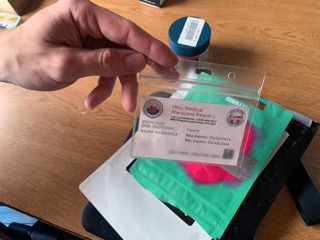Marijuana laws cause conflict on campus as dispensary opens

A Kent State student holds his Ohio Medical Marijuana Registry card. Identifying patient information has been removed to protect his identity.
Editor’s note: the student with the medical marijuana card was granted anonymity for his concerns about disciplinary action.
A medical marijuana dispensary will open across from a campus prohibiting the drug and next to the courthouse students will go to if charged for possessing it.
Bliss Ohio, located at 331 E. Main Street, is set to begin sales April 21. Once open, the dispensary will be first of its kind in

Kent and joins more than 70 dispensaries across the state that have opened since January 2019.
Dwayne Siekman, who owns Bliss Ohio with his wife, Pamela, said the opening has been a long time coming.
“The [Kent] community is a fabulous community,” he said. “It’s underserved when it comes to a medical cannabis program. There are dispensaries in Akron and Cuyahoga Falls but for a community as large and vibrant as Kent we thought this would be a perfect place.”
A government affairs professional by trade, Siekman’s path to the medical marijuana business may be a shocker to some but for him it was a no brainer.
“We got to know the industry, know what they’re focused on and then hearing from patients, and I think the patients [were] the main reason why we wanted to get involved,” he said. “We’re both believers in plant-based medicine, alternative healing options.”
The dispensary and its mission; however, is at odds with the university that defines the community it’s joining, and students with medical cards may face extra hurdles when it comes to treatment on campus.
The university’s receipt of federal funds requires it to adhere to the Drug-Free Schools and Communities Act, which prohibits the possession, use and distribution of illegal drugs and alcohol on campus. Marijuana, along with heroin and LSD, is a Schedule I substance at the federal level. Schedule I substances currently have no accepted medical use and a high potential for abuse, according to the Drug Enforcement Administration.
Kent State University Police Department Sergeant Tricia Knoles said these federal guidelines also apply to university police and require the department to enforce federal marijuana laws, including charging students with medical marijuana cards for possession of the drug on campus.
Under Ohio Revised Code Section 2925.11, possession of up to 100 grams of marijuana is a minor misdemeanor punishable by up to a $150 fine and no possibility of jail time. The Portage County Municipal Court allows first-time offenders to complete a diversion program that removes the drug conviction from their record.
Jamison Offineer, a managing attorney with Student Legal Services, disputed the ability of university police to cite students with medical cards for marijuana possession or use.
“A Kent State University police officer does not have the authority to issue charges under federal marijuana laws,” he wrote in an email. “Federal marijuana laws are enforced by federal law enforcement agencies, such as the Drug Enforcement Administration or the Federal Bureau of Investigation.”
Offineer also said Ohio Revised Code Section 3796.22 “provides that a person registered with Ohio’s Medical Marijuana Patient Registry are not subject to criminal prosecution for possession or use of medical marijuana.”
In a subsequent email, Knoles clarified her statement, which she made at least once before, writing that university police cannot charge students based on federal law but noted officers can make referrals to student conduct for violations of the university’s drug-free policy. Student conduct hearings are separate from local, state and federal laws. Medical marijuana cards are not considered during hearings.
“So, [a medical marijuana card] is irrelevant for the decision-making purposes for conduct, because it’s still not permitted on campus,” said Todd Kamenash, the associate dean for conduct and community engagement.
There were 52 accusations filed against students for controlled substances from 2020 to 2022, according to the university’s DFSCA 2022 Biennial Review. A “vast majority” of controlled substance accusations, Kamenash said, are marijuana related.
If a student is found responsible for a controlled substance violation, they face sanctions that range from a probationary status to expulsion from the university. These sanctions put some students who rely on medical marijuana, especially first and second-year students who are required to live on campus, in a complicated situation where they either forgo their medical treatments or risk having a drug violation on their record.
An anonymous sophomore student living on campus with a medical card said the restrictions cause him worry and stress. He stores his medical marijuana products in a scent-proof bag and takes precautions to avoid detection from hall staff and resident assistants.

“I don’t feel like I’m doing something wrong to where I’m getting away with something,” he said. “I’m simply advocating for, again, a healthy student-life balance for myself by going through the proper procedure of obtaining this product and having it on my person.”
In January, a doctor recommended him for medical marijuana after he was diagnosed with a qualifying condition. Before having a medical card, he often purchased cannabis from street dealers.
“It’s really an unsafe way to go about it, just getting it off the street and doing it yourself,” he said. “Whereas getting the card, there’s a lot more testing and reassurance that goes into the product that you’re getting.”
The student said he would like to see a change in the university’s policies on marijuana, especially for those who follow the legal process to get a medical card.
“It’s absolutely not a fair system for Kent State to promote a healthy student-life balance, or healthy academic and life balance, because how can it be a healthy life if you’re not getting the right medicine that you need?” he said.
Kamenash said a change to university policy is out of the administration’s hands.
“The university is required to go by federal law,” he said. “Federal law is overarching all of our state laws. So, the state may consider medicinal marijuana legal, however, federally, it’s not and the university is funded by federal dollars.”
Dr. Bryon Adinoff, the president of Doctors for Cannabis Regulation, said the DFSCA isn’t as clear cut when it comes to marijuana prohibitions.
“The school is claiming with the Drug-Free Schools and Community Act that they have to abide by federal law, now I read the act and what it says is it has to have a process for dealing with unlawful substance use, drug and alcohol use,” Adinoff said. “Well, medical cannabis is lawful in the state. It doesn’t say, and I couldn’t see where it said anything other than unlawful, it didn’t say unlawful according to federal statute.”
Adinoff said institutions that accept federal funds, such as universities and hospitals, are wary of challenging existing federal restrictions that conflict with state laws.
In 2013, the United States Department of Justice issued the Cole Memorandum that stated the Justice Department would no longer enforce federal marijuana prohibitions in states that legalized “marijuana in some form and that have also implemented strong and effective regulatory and enforcement systems to control the cultivation, distribution, sale and possession of marijuana.”
The memorandum was rescinded by then Attorney General Jeff Sessions in January 2018; however, several bills have since been introduced in Congress that implement into law the protections outlined in the memo.

Doctors for Cannabis Regulation continues to lobby for marijuana legalization and reforms in the medical field, where hospitals resist allowing medical marijuana as part of treatments due to the fear of losing Medicare and Medicaid funding. Adinoff said the Centers for Medicare and Medicaid Services, which oversees those programs, have never not reimbursed hospitals because of medical marijuana use and that prohibiting the drug goes against good medical practice.
“The whole reason we have medical cannabis in the first place, we’ve had it for 25 years now starting in California, is because there are many advantages to cannabis that cannot be found with other drugs,” Adinoff said. “And also, just from a patient care perspective, you have people that are sick and taking cannabis and getting relief from it and all of a sudden they go in the hospital, and they’re sicker and they have to stop one of their medications.”
Siekman said while Bliss Ohio remains committed to treating all patients, he understands the university’s position.
“Any institution that receives federal funds, that’s in their best interest to have a policy to not allow a product on their campus or in their office building or at their bank,” he said. “I think it remains to be seen. One thing we can’t do is find out where people live and no one’s gonna come and monitor them … I think then, it’s personal responsibility. If you feel this is something you need and it helps, I think that’s something that they have to weigh those risk benefits on whether they take it into somewhere that’s not able.”
Alton Northup is a reporter. Contact him at [email protected].

Alton is the news director for The Kent Stater and KSTV. A senior journalism major, this is his seventh semester with The Kent Stater. He previously served...

